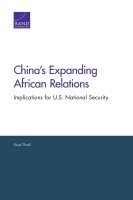| 来源类型 | Research Reports
|
| 规范类型 | 报告
|
| DOI | https://doi.org/10.7249/RR905
|
| ISBN | 9780833088505
|
| 来源ID | RR-905-A
|
| China's Expanding African Relations: Implications for U.S. National Security |
| Lloyd Thrall
|
| 发表日期 | 2015
|
| 出版年 | 2015
|
| 页码 | 132
|
| 语种 | 英语
|
| 结论 |
A Range of Stakeholders and Interests Drive Contemporary Chinese Behavior in Africa - China's government and commercial actors have three primary economic interests in Africa: a source for natural resource imports, a growing and relatively underutilized market for exports and investment, and an opportunity for Chinese firms to increase employment and gain global experience.
- China's principal political interests in Africa include bolstering China's international image and influence, isolating Taiwan, countering problematic international norms, and supporting the stability of economic partners.
- China's emerging security interests in Africa are driven by Beijing's larger interests in safeguarding economic development and increasing political influence. Its foremost emerging security interest is protecting the growing number of citizens and assets from internal instability, popular backlash, terrorism, and kidnapping.
China's Engagement with Africa has Changed Dramatically over the Past Ten Years and Will Likely Continue to Do So - The explosive economic growth of the previous decade should slow as Chinese growth slows and the surge of capital released by the "Go Global" policy subsides. Beijing may have to navigate issues of debt sustainability with African states if economic ties do not balance.
- Significant mismanagement of security crises in Africa could put Beijing's domestic legitimacy and its principles of foreign noninterference in tension. While not likely in the next decade, Beijing could create a minimally invasive capability for reacting to crises, evacuating citizens, and securing assets in Africa.
- The United States and China share fundamental interests in the stability of African states and functioning markets as a prerequisite for the economic benefits, deepening relationships, and global leadership image that each hopes to develop.
It Is Important That the United States Keep Perspective on Chinese Activities in Africa - Recent Chinese engagement in Africa has been driven primarily by economic rather than national security considerations.
- It is possible that Chinese investment in African economies and infrastructure has produced greater benefits for African stability and prosperity than the negative effects of Beijing's opposition to Western political norms and displacement of some indigenous industries.
- U.S. statements comparing the worst of Chinese practices to the best of U.S. ideals suggest to Africans that American leaders are misinformed or ill-intentioned.
- The depth and effects of Sino-American disagreement over pariah states are often overstated.
|
| 摘要 |
- Keep China's unfavorable activities in Africa in perspective. U.S. and Chinese critics both tend to compare an idealized version of their own nation's involvement in Africa with a selective criticism of the other's activities.
- Avoid elevating low-level competition to bilateral strategic tension. China's African relationships are not a strategic threat to American interests in Africa.
- Recognize that China's approach to Africa is likely to be resistant to major change. Sino-American disagreement over international norms in Africa reflects both countries' domestic political structures, histories, and guiding philosophies. These positions are unlikely to change quickly.
- Recognize the realities of Chinese influence in Africa. China will neither leave nor become a dominant force there.
- Reinvigorate U.S. diplomatic and economic engagement with Africa. To support U.S. leadership and buoy international norms, the United States should focus on reinvigorating its African relationships rather than competing with China in Africa.
- Distinguish between PLA crisis reaction and condition-shaping capabilities. There is a critical distinction between forces designed and scaled to react to crises (humanitarian assistance, disaster relief, etc.) and those attempting to shape security conditions.
- Insulate Sino-American relations in Africa from broader geopolitical tensions. U.S. decisionmakers should strive to prevent disagreements over security interests in Africa from disturbing the broader Sino-American relationship.
- Seek opportunities for cooperation with China in Africa. The emerging security threats that the PLA will face in Africa are familiar to the Joint Force, particularly the Army, opening the potential for meaningful exchanges between the respective services. If AFRICOM seeks opportunities for greater engagement with the PLA in Africa, it could undercut containment rhetoric, demonstrate the value of reduced tensions, and lessen anxiety in African capitals over great-power rivalry.
|
| 主题 | Africa
; China
; International Diplomacy
; International Trade
; Peacekeeping and Stability Operations
; United States
; United States Army
|
| URL | https://www.rand.org/pubs/research_reports/RR905.html
|
| 来源智库 | RAND Corporation (United States)
|
| 引用统计 |
|
| 资源类型 | 智库出版物
|
| 条目标识符 | http://119.78.100.153/handle/2XGU8XDN/107931
|
推荐引用方式
GB/T 7714 |
Lloyd Thrall. China's Expanding African Relations: Implications for U.S. National Security. 2015.
|
|
文件名:
|
x1495296738833.jpg
|
|
格式:
|
JPEG
|

|
文件名:
|
RAND_RR905.pdf
|
|
格式:
|
Adobe PDF
|
除非特别说明,本系统中所有内容都受版权保护,并保留所有权利。